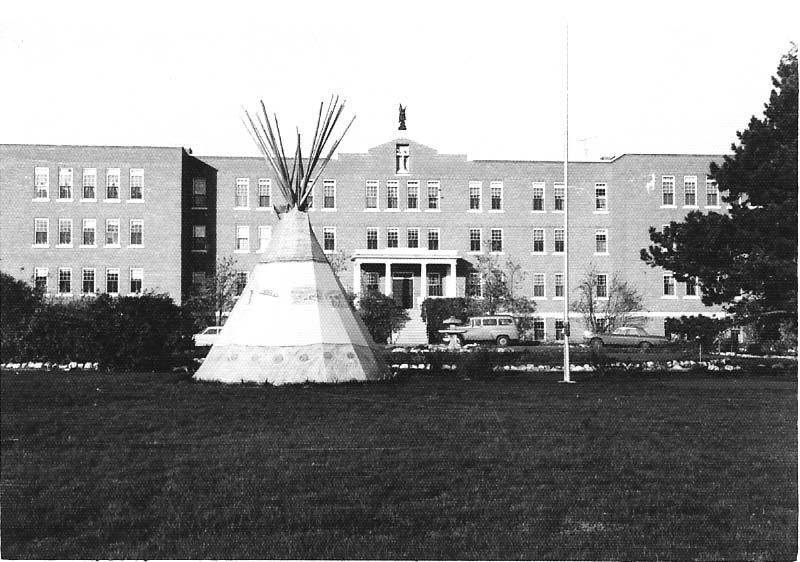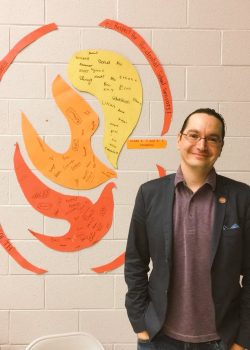
Ermineskin Roman Catholic Residential School, located in Hobbema, Alberta, operated between 1916 and 1973.
Facing conflicting values in post-secondary education
The following is an op-ed written by Kevin Lamoureux, Head of Education at the National Centre for Truth and Reconciliation.
Back in 2008, I traveled to the community of Cowichan on Vancouver Island to attend the North American Indigenous Games (NAIG). My kid sister-in-law was playing baseball for Team Manitoba (we placed 5th overall, earning almost a full 900 total points less than rival Saskatchewan) and so my soon to be wife and I made the trip to the island. I suppose we all have moments that remind us of other moments and in that place, framed by the Cowichan Valley and the Strait of Georgia, I was reminded of a personal crisis I had experienced several years prior. Not a dramatic crisis, but an internal struggle I was faced with, coming to terms with my life in university. It is a struggle that has played out many times, and in many different contexts; and it is a struggle that I recognize in many students today, almost a full generation later.
In the late 19th century, celebrated Anthropologist Frank Boas (who is considered by some to be the Father of American Anthropology) visited the Cowichan Valley to steal human remains from Indigenous burial sites. He was not alone. The practice of grave robbing for academic purposes was widespread and underpinned work in the later discredited field of phrenology, which laid the framework for early understandings of intelligence. IQ tests would later be used to justify the forced sterilization of Indigenous women and girls. Field studies would later justify racist interpretations of Indigenous cultures, which justified policies such as the Gradual Civilization Act. The ‘knowledge’ gained by anthropologists, and later psychologists, sociologists, medical researchers, educators, and many others would be referenced in justifications for Residential Schools, the 60’s scoop, forced relocations, and the banning of traditional practices. All this without even beginning to discuss the grief, horror and rage that must have come with discovering that the graves of ancestors were desecrated in the name of civilization. Standing in the bleachers around the baseball diamond that afternoon, I was reminded of what it felt like to learn these truths while pursuing an undergraduate degree at a Canadian university.
I have heard others talk about this crisis before. Some African American educators in the United States have talked about the forced choice dilemma that some of their students face in public schools. It is the dilemma that students find themselves in, when they have to choose between being successful in school or being loyal to their home community. For some, this tension may be hard to understand, especially where school has represented for them opportunity and pathways to success. For forced minorities however, minorities who have that status forced upon them through colonization or violence such as slavery, school may not represent opportunity. Because of Residential Schools in Canada, school has represented something very dark and sinister for far too many Indigenous peoples. Indigenous students will sometimes find themselves in a forced choice dilemma when not only their families mistrust schools, but the curriculum and content continues to denigrate or diminish Indigeneity. Where the cultural values and assumptions enforced, either intentionally or implicitly, pit students against themselves in order to achieve successful grades.
Complicit in colonization
Post-secondary institutions and education have been complicit in colonization. For example, the biased knowledge imbued to faculty and students within universities and colleges contributed to a systemic racism that helped governments justify assimilation policies and practices that have resulted in cultural genocide for Indigenous Peoples in Canada. As I began to discover these truths, as I did when I learned about the revered Frank Boas, I was faced with a profound sense of guilt, shame, rage and confusion. I worried that over time I was becoming an ‘Apple,’ which is a derogatory term for an Indigenous person who sells out their culture to ‘become white on the inside.’ I worried that as I got closer and closer to my degree I was losing who I was, the me that I had hoped to be for my children one day.
Who cares? At least I was getting an education, and becoming the first in my immediate family to do so. I was looking at the potential of finding a career and earning a pay-cheque. I would be able to buy things and contribute to the economy. Why worry about losing a cultural identity if I am gaining another one? I suppose such questions can be justified from the vantage point of the culture sitting in the dominant position. Why not be like us? Certainly, Dr. Boas would have thought that way.
Senator Murray Sinclair has said that culture answers the big questions for us in life: where do I come from, who am I, why do I exist, where am I going? Because of cultural genocide in Canada, many Indigenous children have been forced to rely on someone else’s answers to these questions. For Indigenous children, who are often visibly different from the mainstream, historically traumatized, and carry in their blood memory the wounds of colonization. Wounds justified in peer-reviewed papers. Being forced to rely on mainstream answers to the big questions does not add up and causes further trauma, conflict and disconnect.
Rethinking
The Calls to Action of the Truth and Reconciliation Commission have given us the opportunity to rethink business as usual in Canada, and to begin to heal from legacy of the past. As Canadians, we have all inherited the wreckage of historic broken relationships. Even though we ourselves may not have created the problem, we collectively live with the consequences. University professors are no longer robbing graves and doctors are no longer sterilizing young women to keep the Canadian gene pool from becoming tainted; but we certainly continue to live in the social and legal frameworks that emerged through colonization. Indigenous people continue to be under-represented in post-secondary institutions. Historic mistrust persists. Questionable academics continue to produce writings that suggest that First Nations Rights are a fantasy. These are all symptoms of a society in need of healing.
At the same time, courageous University leaders are making huge strides towards Reconciliation. The Calls to Action are coming to life through the work of professors, researchers, and students across the country. Indigenous Knowledge is slowly being given its appropriate respect alongside Western intellectual disciplines. The voices of outspoken racists are being challenged and more and more young Canadians are becoming inspired in post-secondary institutions to be not just concerned citizens, but transformative. At the core of any effort towards ‘Indigenization’ (which in itself is a troubled term) should be a commitment to safety. Safety of students, communities, cultural identity, cultural expression, grief and healing. Safety in this context does not mean avoiding difficult conversations, but rather a commitment to respectful relationships with Canada’s First People.
We do not have to claim responsibility for the past but we do have to claim responsibility for the future. Where university knowledge was once used to harm Indigenous peoples, post-secondary institutions today can use their privileged place in society to create change. To challenge discriminatory policy, to stand united with Indigenous communities defending their rights, to honour Traditional Knowledge Keepers and the sacred relationship between Indigenous Peoples and this beautiful Turtle Island we call home. Every post-secondary institution in Canada should be making a commitment to abide by the United Nations Declaration on the Rights of Indigenous Peoples as a framework for Reconciliation. Watching young people play baseball in Cowichan Valley ultimately reminded me of the strength, resiliency and beauty of Indigenous Peoples. Thanks to the generosity and strength of Residential Schools Survivors, Canada has the opportunity to acknowledge its past, heal itself, and begin to enjoy rights-based relations with First Nations, Métis and Inuit people. Where school was once used as a weapon against Indigenous children, our institutions can be places of healing, empowerment, and justice.







